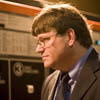Strange Signals
Woody Skinner’s A Thousand Distant Radios tunes into odd frequencies
Woody Skinner’s debut story collection, A Thousand Distant Radios, delivers fully realized, believable characters in contemporary settings (most of them in Arkansas). They speak in long stretches of dialog that reveal the author’s good ear and understated humor. They move within scenes constructed in deceptively simple language. Within any given sentence, you might be tempted to believe you’re reading Southern fiction in the tradition of Peter Taylor or Lee Smith.
 Taken as a whole, on the other hand, these stories veer toward stranger things. (A few stop only an odd child or monster shy of Stranger Things.) The dull world of social media and traffic jams suddenly morphs into the tale of a woman giving birth to a fish (Spanish mackerel, a girl), or a knife salesman who performs supermarket-style cutlery demos before rock arenas full of blood-thirsty fans.
Taken as a whole, on the other hand, these stories veer toward stranger things. (A few stop only an odd child or monster shy of Stranger Things.) The dull world of social media and traffic jams suddenly morphs into the tale of a woman giving birth to a fish (Spanish mackerel, a girl), or a knife salesman who performs supermarket-style cutlery demos before rock arenas full of blood-thirsty fans.
Some characters move through mundane events against an unseen but nonetheless ominous environmental force-the dotted sand of a Gulf Coast oil spill in “Summering,” or the smoke of a distant collision that has shut down Interstate 40 on the Fourth of July in “Even the Trees Were Sweating.” Such stories evoke the work of Don DeLillo by combining precise human studies with implied social critique.
In other stories the focus moves inward. “Weight” delivers the first sexual experience of a sixteen-year-old girl, while “The Wavering Grass” does the same for an Angus cow named Muriel. “The bull had enlivened her body, made it delicate, even as her bones thickened,” Skinner writes of the cow. “Welcome to a world where gravity is made of doubt,” he writes of the girl in her boyfriend’s derelict trailer. In both cases the reader is pulled into the character-regardless of species-not by the somewhat normal events Skinner depicts but by the careful language which imbues these events with deeper meaning.
 Nevertheless, the conceits at the heart of Skinner’s stories are not the usual fare of fantasy or science fiction; they’re closer to the rhetoric of poetry. As in a poem, no word appears by chance, and the rules of the everyday world may or may not apply. With the repetition of certain words and themes the poet builds a rhythm that exists beyond the facts of narrative and points toward a moment of balance-and that moment is when suddenly things shift. The mundane may become magical, or the magical mundane, but it’s the shift in balance that delights the reader. As in a good poem, the quirky can jump into the sublime.
Nevertheless, the conceits at the heart of Skinner’s stories are not the usual fare of fantasy or science fiction; they’re closer to the rhetoric of poetry. As in a poem, no word appears by chance, and the rules of the everyday world may or may not apply. With the repetition of certain words and themes the poet builds a rhythm that exists beyond the facts of narrative and points toward a moment of balance-and that moment is when suddenly things shift. The mundane may become magical, or the magical mundane, but it’s the shift in balance that delights the reader. As in a good poem, the quirky can jump into the sublime.
Whether the story focuses on the fantastic or the everyday tends to be almost beside the point. “You are the only Nikole in your class,” he writes of the protagonist in “Weight,” a story written in second-person narration. “Someday you’ll understand what it means that your name is spelled differently. Someday, when you’re selling pharmaceuticals in a place that would now seem inconceivably big, inconceivably urbane, like Nashville or Atlanta or even Birmingham, you’ll blush at the provincial spelling of your name. But not now. Now you’re sixteen and you live in rural Arkansas and it’s your birthday.” Lines like these point toward an inevitable transformative moment. When it comes, the weirdness of a given story makes a kind of satisfying sense.
Like episodes of a hit Netflix series, the tales of A Thousand Distant Radios are hard to take one at a time-you’ll want to binge them in one sitting, eager to see the literary payoff of the next strange thing. It’s a strangeness that can leave you breathless, delivered by a writer who is going places.

Michael Ray Taylor chairs the communication and theatre arts department at Henderson State University in Arkadelphia, Arkansas. He is the author of several books of nonfiction.


